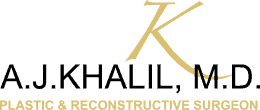Whether it is from women who are considering having breast augmentation and want to have children later or from women who already have breast implants and are now considering having kids, Dr. A.J. Khalil receives a lot of questions about what kind of impact breast implants have on breastfeeding. Many of these women assume that implants would prevent them from nursing their children.
Fortunately, that is not accurate: most women with breast implants have no trouble breastfeeding. Here, Dr. Khalil explains what women can expect if they want to breastfeed after having breast augmentation.
Surgical Factors That Can Have an Impact
Although most women with implants do not have any issues with breastfeeding, it’s good to be aware of the factors that could lead to problems. One factor is the placement of the implant(s). Most women who get breast implants have their implants placed behind the milk glands or beneath the chest muscles. These are great placements to avoid disrupting the milk ducts and nerves.
Another key factor is the incision type. Dr. Khalil can use one of several incision types to place an implant, including along the lower breast crease, inside the armpits or even inside the belly button. The incision that women who may want to breastfeed should probably avoid is the periareolar incision (an incision made around the areola). That can potentially harm the nerves around the nipples, which play an important role in breastfeeding. When a baby sucks on the nipple, these nerves communicate with the ducts to release milk.
Women who have had cosmetic surgery simply to make their breasts larger and more appealing tend to have better luck when it comes to breastfeeding. That’s because women who use implants to correct more significant issues like insufficient breast tissue development may have preexisting problems that would impact their ability to breastfeed with or without implants.
Dr. Khalil discusses all of these factors during the initial breast augmentation consultation.
Safety Considerations
From a safety standpoint, the news is good: research has found no evidence that babies are in any way endangered by nursing from breasts with implants, including silicone implants.
On the flip side, a nursing baby does nothing to physically harm the implants. While breasts may look different once the baby has weened, this is largely due to the natural changes the breasts go through during pregnancy and breastfeeding rather than because the implants themselves have changed. Some women may choose to remove their implants and replace them with new implants at this point, or undergo breast lift to counteract sagging breast skin and tissue.
The presence of scar tissue inside the breast (an inevitable consequence of breast augmentation surgery) can make breastfeeding more uncomfortable for some women.
Maximizing Milk Production
Although most women can still produce milk with implants, some women with implants do end up producing a bit less milk than women without implants. Women who notice this phenomenon should take the same steps that any other woman to boost milk production, such as pumping, latching for longer, taking supplements and relaxing more.
Speak to Dr. Khalil
Dr. Khalil is a board-certified plastic surgeon who prioritizes patient care. With his advanced surgical skills, he ensures that his patients do not have to choose between augmenting their breasts and breastfeeding. If you would like to learn more about breast procedures from Dr. Khalil, please call (310) 385-8601.
